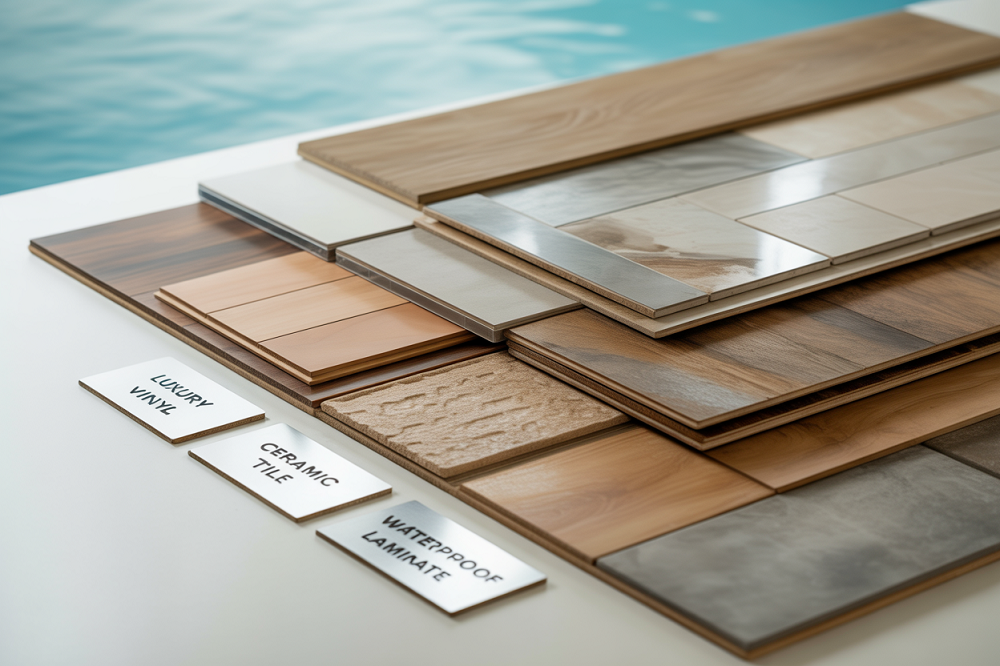NEWS TAG
brand
What is the Best Flooring for Humid Climates & Moisture-Resistant?
Choosing the right flooring for humid environments can be a challenge, but it’s an important decision for the longevity and comfort of your home. High humidity and frequent moisture can damage many traditional floor coverings, leading to warping, swelling, mold, or unpleasant odors. Fortunately, several flooring types are designed to cope well in these conditions, ensuring your floors remain beautiful and functional year-round. This guide covers the top flooring choices for humid climates, as well as practical tips for preventing moisture-related issues.

What is the Best Flooring for Humid Climates?
Humidity brings unique challenges for floors, so the main aspect to check when selecting flooring for wet or moisture-prone spaces is if the product is truly waterproof or at least water-resistant. In some regions, such as New Zealand, building codes require E3-compliant documentation for wet area floor coverings. This ensures the surface is completely waterproof, preventing water from seeping through and damaging the subfloor or structure below.
Certain materials, like tiles, vinyl, and hybrid flooring, are known for their moisture resistance. Among these, vinyl and hybrid options are considered 100% waterproof; they don’t swell even when fully submerged in water. Other products, such as certain laminates, offer a waterproof surface but rely heavily on proper installation to prevent water from penetrating joints.
When selecting flooring for humid climates, it’s also important to consider characteristics such as durability, fade resistance, and slip resistance, especially in areas like bathrooms, kitchens, basements, or entryways. Additionally, the subfloor preparation can play a crucial role in the performance of your chosen material, particularly in spaces with concrete slabs that may naturally allow moisture to pass through.
Best Floors For Humid Climates
There are several flooring types that perform reliably in humid environments, each with their own benefits:
1. Luxury Vinyl Plank (LVP) and Luxury Vinyl Tile (LVT)
LVP and LVT are top choices for humid climates. These floors mimic the appearance of hardwood or stone, providing style without the maintenance challenges. They are made from multiple layers, including a durable wear surface and a waterproof PVC core. Because they are 100% waterproof, LVP and LVT are suitable for every room, including bathrooms and kitchens. They’re also scratch, dent, and stain resistant, and their floating installation makes them DIY-friendly. LVP’s flexibility allows it to conform to subfloor imperfections, making it especially practical for basements or older homes.
2. Ceramic and Porcelain Tile
Tiles are a classic solution for high humidity, offering natural resistance to water and a dense, impermeable surface. They stay cool underfoot, which is comfortable in warm climates, and are available in a wide range of styles. Proper installation is important; using an underlayment mat like Ditra can help prevent cracking and allow for minor subfloor movement. Tiles can be more costly to install, but they provide excellent durability and water resistance.
3. Engineered Hardwood
Engineered hardwood consists of a real wood veneer on top of a layered plywood core, enhancing its stability in humid environments. Unlike solid hardwood, which can warp or swell, engineered planks are less prone to these issues thanks to their construction. They provide the elegance of wood flooring while being more suitable for regions with fluctuating humidity.
4. Waterproof Laminate
Modern laminate flooring has evolved, with some products now rated as 100% waterproof. These newer laminates feature a specially engineered core that resists water damage, making them suitable for kitchens, bathrooms, and other damp spaces. Laminate is appreciated for its affordability, easy installation, and strong resistance to scratches.
5. Cork Flooring
Cork is a soft, eco-friendly option that naturally resists water and can be further sealed for extra protection. It’s comfortable underfoot, offers excellent insulation, and is a sustainable choice for those seeking greener flooring solutions.
6. Bamboo Flooring
Bamboo performs better in humidity than traditional hardwood, offering more water resistance while being a renewable, environmentally friendly material. It’s strong, resilient, and holds up well in homes with changing moisture levels.
7. Rubber Flooring
Rubber flooring is highly practical for spaces exposed to constant moisture. It provides natural slip resistance and is easy to clean, making it ideal for laundry rooms, gyms, and basements.
More Flooring Tips To Prevent Moisture
Beyond selecting the right flooring material, there are several strategies to help manage moisture and protect your investment:
Proper Subfloor Preparation: In basements or areas with concrete slabs, using a subfloor system (such as panels with foam or dimpled plastic layers) can block moisture from reaching your finished flooring. This prevents condensation and helps avoid mold growth and musty odors.
Professional Installation: Especially with products that rely on tight seams, such as waterproof laminate or hybrid floors, correct installation is vital. Poorly fitted joints can let moisture in, reducing the effectiveness of even “waterproof” floors.
Regular Maintenance: Keep floors clean and dry. For most waterproof or water-resistant floors, a damp mop is sufficient—avoid soaking wet cleaning methods, which can force water into seams.
Consider Underlayments: Adding a moisture barrier or underlayment beneath your flooring can provide additional protection, especially in wet areas or over concrete.
Control Indoor Humidity: Use dehumidifiers, proper ventilation, and air conditioning to keep indoor humidity in check, especially in climates where moisture is a persistent challenge.
Check for E3 Compliance: In regions with specific building codes, look for flooring products with the appropriate certifications to ensure compliance and performance.
Choosing the ideal flooring for humid climates involves more than just picking a moisture-resistant material. It’s about considering the needs of each room, assessing the subfloor, and ensuring proper installation and ongoing care. Options like luxury vinyl plank, ceramic tile, engineered hardwood, and new waterproof laminates provide durable, attractive solutions that can thrive in humid conditions. By combining the right product with smart installation and maintenance practices, your floors will remain beautiful, comfortable, and resilient for years to come
